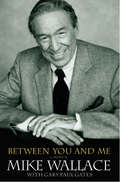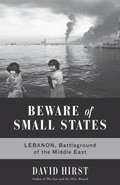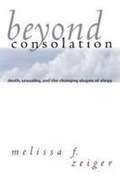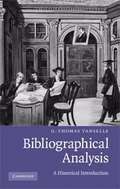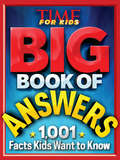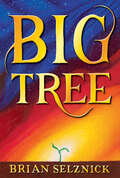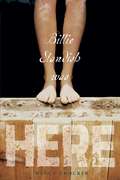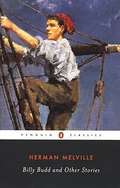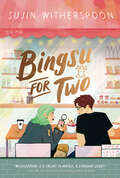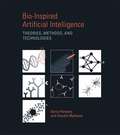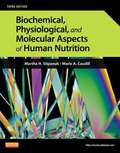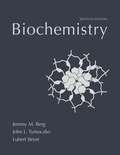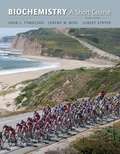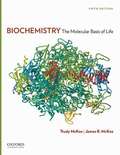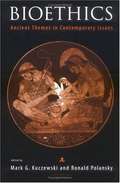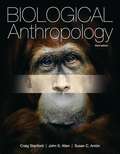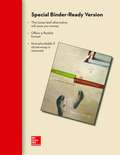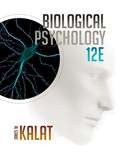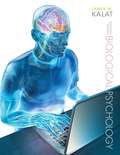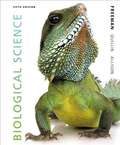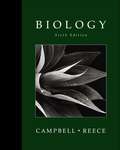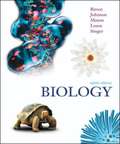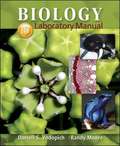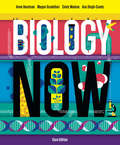- Table View
- List View
Between You and Me: A Memoir
by Mike Wallace Gary Paul GatesAt the age of 87, Mike Wallace is a legendary figure in broadcast journalism. Now, after 60 years of reporting on important events around the world, he shares his personal stories about the incredible range of celebrities, newsmakers, criminals, and world leaders who have subjected themselves to his unique brand of questioning.Through Wallace's intimate observations about these figures, we experience afresh the pivotal events that have shaped our world. Here, we meet the guilt-racked Secret Service agent assigned to John F. Kennedy's car in Dallas. We learn about the candid moment when President Nixon revealed an unexpected softer side. We witness the underpinnings of the century's greatest social movement through Wallace's eyes as he manages to earn the trust of major civil rights leaders, and we see the trauma Wallace experienced while covering the conflict in Israel. These off-camera anecdotes and fascinating excerpts from Wallace's interviews--with everyone from Eleanor Roosevelt to all the presidents of the last half century, from Frank Lloyd Wright to Johnny Carson, from Margaret Sanger to Malcom X--give us a new perspective on some of the greatest lives and minds of our time.With a reporter's eye for detail, Wallace mingles laughter, tragedy, and revelatory insight in a memoir unlike any other. For anyone who's ever wondered what it's like to make history for a living, this is a must-read.
Beware of Small States: Lebanon, Battleground of the Middle East
by David HirstLebanon, a country no bigger than Connecticut, has become a battleground for the political, strategic and ideological conflicts of its neighbors and the great powers. It has come to reflect the broad historical experiences of the modern Middle East. Beware of Small Statesis an elegant and incisive history of Lebanon culminating with the 2006 war between Israel and Hezbollah and its aftermath. David Hirst-a former Middle East correspondent forThe Guardian, whose tough, skeptical voice has earned him death threats and seen him banned from six Arab countries-crafts a narrative that is essential for anyone wishing to understand the current political climate of the Middle East.
Beyond Consolation: Death, Sexuality, and the Changing Shapes of Elegy
by Melissa F. ZeigerUsing as her starting point the story of Orpheus and Eurydice, Melissa F. Zeiger examines modern transformations of poetic elegy, particularly as they reflect historical changes in the politics of gender and sexuality.
Bibliographical Analysis
by G. Thomas TanselleStudying printed books as physical objects can reveal not only how books were produced, but also how their design and layout features emerged and came to convey meanings. This concise and accessible introduction to analytical bibliography in its historical context explains in clear, non-specialist language how to find and analyze clues about a book's manufacture and how to examine the significance of a book's design. Written by one of the most eminent bibliographical and textual scholars working today, the book is both a practical guide to bibliographical research and a history of bibliography as a developing field of study. For all who use books, this is an ideal starting point for learning how to read the object along with the words.
Big Book of Answers: 1,001 Facts Kids Want to Know (Time For Kids Big Bks.)
by Editors of TIME For Kids MagazineIn a great new oversized format, TIME For Kids Big Book of Answers satisfies the most curious kids with answers to the questions they commonly ask but adults can rarely answer. Questions like ""How does popcorn pop?"", ""Where did the Titanic sink?"" and ""Why are our eyes different colors?"" are grouped into easy-to-navigate categories such as animals, humans, history, science and sports. Colorful photos, dynamic graphics, and simple text help kids discover 1,001 amazing facts to impress their parents, teachers, friends...and anyone else who will listen
Big Tree
by Brian SelznickThe fate of all life on Earth may depend on the bravery of two little seeds in this epic adventure from the #1 New York Times bestselling creator and Caldecott Medalist of The Invention of Hugo Cabret."The tale of the natural world is the greatest story we have to tell, and Brian delivers a brilliant chapter of that tale throughout the pages of Big Tree." - STEVEN SPIELBERG"We need brave, big stories like [Big Tree]." -The New York Times Book Review"Has the power to intrigue...affecting." - The Wall Street Journal* "An enthralling and expansive meditation on what it means to be alive on this planet." - Booklist, starred review* "A balanced and rich book. . . . Powerful."-The Bulletin of the Center for Children's Books, starred and recommended review* "In evocative prose and peppery dialogue . . . the cinematic story journeys across time and space, contemplating the power of life to heal." -Publishers Weekly, starred review* "A special, one-of-a-kind book for the whole family that readers won't soon forget." - School Library Journal, starred review* "Masterful." - The Horn Book, starred review"Inspirational, important, and beautiful. A fable for our times." - Alan Gratz, bestselling author of Refugee and Ground Zero"Hello, stars. I thought I heard you calling me."A mysterious voice has been speaking to Louise in her dreams. She and her brother Merwin are Sycamore seeds, who hope to one day set down roots and become big trees. But when a fire forces them to leave their mama tree prematurely, they find themselves catapulted into the unknown, far from home. Alone and unprepared, they must use their wits and imagination to navigate a dangerous world-filled with dinosaurs, meteors, and volcanoes!-and the fear of never finding a safe place to grow up. As the mysterious voice gets louder, Louise comes to realize their mission in life may be much bigger than either of them ever could have imagined!Brimming with humor, wonder, mystery, and a profound sense of hope, Big Tree is a trailblazing adventure, illustrated with nearly 300 pages of breathtaking pictures. It is Selznick's most imaginative and far-reaching work to date and a singular reading experience for the whole family.The audiobook edition of BIG TREE is brought magnificently to life by Meryl Streep and features music composed by Ernest Troost.
Billie Standish Was Here
by Nancy CrockerCAN ONE UNLIKELY FRIENDSHIP SAVE A LIFE? Billie Standish has pretty much no one. Her parents are too caught up in their own lives, and the only two girls in town her age want nothing to do with her. When it looks like a nearby levee might break, and Billie's elderly neighbor, Miss Lydia, is the only other person besides her family to stick around, a friendship is born out of circumstance. What happens during that time, in that empty town, is a tragedy that Billie can't bear alone. Can the love of one woman nearing the end of her life save the life of a young woman just at the beginning of living hers?
Billy Budd and Other Stories
by Herman Melville Frederick Busch"Billy Budd, Sailor," a classic confrontation between good and evil, is the story of an innocent young man unable to defend himself from wrongful accusations. Other selections include "Bartleby," "The Piazza," "The Encantadas," "The Bell-Tower," "Benito Cereno," "The Paradise of Bachelors," and "The Tartarus of Maids."
Bingsu for Two
by Sujin WitherspoonThis outrageously charming and infuriatingly adorable enemies-to-lovers coffee shop romance is perfect for fans of YA books by Jenny Han and Better Than the Movies. Meet River Langston-Lee. In the past 24 hours, he&’s dumped his girlfriend, walked out of his SATs, and quit his job at his parents&’ cafe in spectacularly disastrous fashion—even for him. Somehow, he manages to talk his way into a gig at a failing Korean cafe, Bingsu for Two, which is his lucky break until he meets short, grumpy, and goth: Sarang Cho. She&’s his new no-BS co-worker who&’s as determined to make River&’s life hell as she is to save her family&’s cafe. After River accidentally uploads a video of his chaotic co-workers to his popular fandom account, they strike viral fame. The kicker? Their new fans ship River and Sarang big-time. In order to keep the Internet&’s attention—and the cafe&’s new paying customers—River and Sarang must pretend that the tension between them is definitely of the romantic variety, not the considering the best way to kill you and hide your body variety. But when Bingsu for Two&’s newfound success catches the attention of River&’s ex and his parents&’ cafe around the corner, he faces a choice: keep letting others control his life or stand up for the place that&’s become home. And a green-haired girl who&’s not as heartless as he originally thought . . . Bingsu for Two delivers a swoon-worthy romance that'll make you crave a Korean cafe adventure of your own. Fans of young adult romance books and books for teen girls will love this addictive debut that dishes up a serving of humor, heart, and hope.
Bio-Inspired Artificial Intelligence: Theories, Methods, and Technologies
by Dario Floreano Claudio MattiussiNew approaches to artificial intelligence spring from the idea that intelligence emerges as much from cells, bodies, and societies as it does from evolution, development, and learning. Traditionally, artificial intelligence has been concerned with reproducing the abilities of human brains; newer approaches take inspiration from a wider range of biological structures that that are capable of autonomous self-organization. Examples of these new approaches include evolutionary computation and evolutionary electronics, artificial neural networks, immune systems, biorobotics, and swarm intelligence--to mention only a few. This book offers a comprehensive introduction to the emerging field of biologically inspired artificial intelligence that can be used as an upper-level text or as a reference for researchers. Each chapter presents computational approaches inspired by a different biological system; each begins with background information about the biological system and then proceeds to develop computational models that make use of biological concepts. The chapters cover evolutionary computation and electronics; cellular systems; neural systems, including neuromorphic engineering; developmental systems; immune systems; behavioral systems--including several approaches to robotics, including behavior-based, bio-mimetic, epigenetic, and evolutionary robots; and collective systems, including swarm robotics as well as cooperative and competitive co-evolving systems. Chapters end with a concluding overview and suggested reading.
Biochemical, Physiological, And Molecular Aspects of Human Nutrition
by Martha H. Stipanuk Marie A. CaudillCovering advanced nutrition with a comprehensive, easy-to-understand approach, Biochemical, Physiological, and Molecular Aspects of Human Nutrition, 3rd Edition focuses on the biology of human nutrition at the molecular, cellular, tissue, and whole-body levels. It addresses nutrients by classification, and describes macronutrient function from digestion to metabolism. This edition includes the new MyPlate dietary guide and recommendations from the Dietary Guidelines for Americans 2010, plus coverage of the historical evolution of nutrition and information on a wide range of vitamins, minerals, and other food components. In Biochemical, Physiological, and Molecular Aspects of Human Nutrition, lead authors Martha H. Stipanuk and Marie A. Caudill are joined by a team of nutrition experts in providing clear, concise, coverage of advanced nutrition.
Biochemistry Seventh Edition
by John L. Tymoczko Jeremy M. Berg Lubert StryerSince its first edition in 1975, this extraordinary textbook has helped shape the way biochemistry is taught, offering exceptionally clear writing, innovative graphics, coverage of the latest research techniques and advances, and a signature emphasis on physiological and medical relevance. Those defining features are at the heart of the new Seventh Edition of Biochemistry, which again communicates fundamental concepts and the latest breakthroughs in a way that makes the information engaging and understandable for students approaching the subject for the first time.
Biochemistry: A Short Course (Second Edition)
by John L. Tymoczko Jeremy M. Berg Lubert StryerThis book covers the fundamentals of biochemistry and its topics are broadly grouped under three parts : Molecular design of life,Transducing and storing energy and Synthesizing the molecules of life.
Biochemistry: The Molecular Basis of Life
by James R. Mckee Trudy MckeeBiochemistry: The Molecular Basis of Life is an intermediate, one-semester text written for students on degree pathways in Chemistry, Biology and other Health and Life Sciences. Aimed at students with one unit of Organic Chemistry, it focuses on essential biochemical principles that underpin the modern life sciences, and offers a balanced coverage of chemistry and biology.
Bioethics: Ancient Themes in Contemporary Issues
by Mark G. Kuczewski Ronald M. PolanskyThis collection of essays explores themes from ancient Greek philosophy and medicine and their implications for contemporary medicine and bio-medical ethics. Thus the work examines the relationship of two of the most popular areas in the current revival of ethics, namely, classical ethics and biomedical ethics--areas that have seldom been brought together in any serious or sustained way. The essays in this volume are written by established classical scholars and bioethicists.
Biological Anthropology (3rd Edition)
by John S. Allen Craig Stanford Susan C. AntonDiscover the Best of Biological Anthropology: From its Earliest Foundations to its Most Current Innovations Biological Anthropology, 3/e is written to appeal to a wide range of students. It continues to build upon the strength and success of its first and second editions by integrating the foundations of the field with the most current innovations happening today. Over the past 40 years, biological anthropology has rapidly evolved from the study of physical anthropology into biological anthropology. Biological anthropology is now an integrative combination of information from the fossil record and the human skeleton, genetics of individuals and of populations, our primate relatives, human adaptation, and human behavior. The third edition of Biological Anthropology combines the most up-to-date, comprehensive coverage of the foundations of the field with modern innovations and discoveries. Teaching and Learning Experience Personalize Learning - MyAnthroLab delivers proven results in helping students succeed, provides engaging experiences that personalize learning, and comes from a trusted partner with educational expertise and a deep commitment to helping students and instructors achieve their goals. Improve Critical Thinking - Visual summaries, critical thinking questions, Insights and Advances boxes and author suggested readings found within each chapter encourage students to examine assumptions, discern hidden values, evaluate evidence, assess conclusions, and more!
Biological Anthropology: Concepts and Connections
by Agustín FuentesBiological Anthropology: Concepts and Connections shows the relevance of anthropological concepts to today's students and encourages critical thinking. Throughout the text and especially in its many “Connections” features, Agustin Fuentes links anthropological concepts and questions to students’ lives. One of the top scholars in the field of biological anthropology, Agustin Fuentes’ current research looks at the big questions of why humans do what they do and feel the way they feel. He is committed to an integrated, holistic anthropological approach. Fuentes wrote this text to help answer the “so what” questions and make anthropological knowledge relevant to everyday life.
Biological Psychology
by James W. KalatDr. James W. Kalat's BIOLOGICAL PSYCHOLOGY is widely used for good reason: an extremely high level of scholarship, a clear writing style with amusing anecdotes, and precise examples. Kalat's goals are to make biological psychology accessible and to convey the excitement of the search for biological explanations of behavior, and he delivers. Updated with new topics, examples, and recent research findings, the new 12th edition continues this book's tradition of quality.
Biological Psychology (Eleventh Edition)
by James W. KalatThe most widely used text in its course area, Dr. James W. Kalat's BIOLOGICAL PSYCHOLOGY appeals to students and instructors alike. Throughout all eleven editions, the goal has been to make biological psychology accessible to psychology students, not just to biology majors and pre-meds. The goal has also been to convey the excitement of the search for biological explanations of behavior. Kalat believes that biological psychology is "the most interesting topic in the world," and this text convinces many students--and perhaps you, too--with its clear writing style, amusing anecdotes, and intriguing examples. A media-rich, highly interactive online eBook integrates the text with videos, animations, and an online bio-lab component, making it easier for you to learn.
Biological Science
by Scott Freeman Michael Black Emily Taylor Kim Quillin Lizabeth Allison Greg Podgorski Jon MonroeBiological Science, Fifth Edition contains many new or expanded features, all of them targeted at ways to help students learn to construct their own knowledge and think like biologists. The book provides scaffolding to help students learn at the level called for by the National Academy of Sciences, the Howard Hughes Medical Institute, the American Association of Medical Academies, and the National Science Foundation.
Biology (6th edition)
by Jane B. Reece Neil A. CampbellReflecting the changing landscape of the subject it surveys, this Sixth Edition of BIOLOGY is our most sweeping revision ever. But throughout the revision process, we have kept in mind the two core goals of all earlier editions: to explain the key con¬cepts of biology clearly and accurately within a context of unifying themes, and to help students develop positive and realistic impressions of science as a process of inquiry. These two teaching values evolved in the classroom, and we are obviously gratified that the book's dual emphases on concept-building and the process of science have appealed to the educators and students who have made BIOLOGY the most widely used college science textbook. But with this privilege of sharing biology with so many students comes the responsibility to continue improving the book to serve the biology community even better. Thus, throughout the entire planning and revision process, we visited dozens of campuses to listen to what students and their professors had to say about their biology courses and textbooks. These conversations with faculty and students informed the many improvements you'll find in this Sixth Edition.
Biology (Ninth Edition)
by Peter H. RavenThe ninth edition of this text provides a clear and accessible overview of the key topics in biology, placing the emphasis on evolution and scientific inquiry.
Biology 11th Edition
by Sylvia S. Mader Michael WindelspechtSylvia Mader represents one of the icons of science education. Her dedication to her students, coupled with her clear, concise writing style has benefited the education of thousands of students over the past three decades. Dr. Michael's Windelspecht: The integration of text and the digital world are now complete with the addition of Michael's Windelspecht's expertise in the development of digital learning assets.
Biology Laboratory Manual (Tenth Edition)
by Randy Moore Darrell VodopichThe Biology Laboratory Manual by Vodopich and Moore was designed for an introductory biology course with a broad survey of basic laboratory techniques. The experiments and procedures are simple, safe, easy to perform, and especially appropriate for large classes. Few experiments require more than one class meeting to complete the procedure. Each exercise includes many photographs, traditional topics, and experiments that help students learn about life. Procedures within each exercise are numerous and discrete so that an exercise can be tailored to the needs of the students, the style of the instructor, and the facilities available.
Biology Now
by Anu Singh-Cundy Anne Houtman Megan Scudellari Cindy MaloneA balance of science and story, with a focus on the people doing biology now.Written by a science journalist and teachers with over thirty years experience in the classroom, Biology Now skillfully blends core biology concepts with popular science stories of real people doing science today. These stories capture the human face of biology, highlighting the work of researchers and medical professionals who are making new discoveries every day. The text is accompanied by a wealth of carefully crafted pedagogy that teaches students how to analyze science in the news, interpret data, ask questions, and distinguish between science and pseudoscience.
